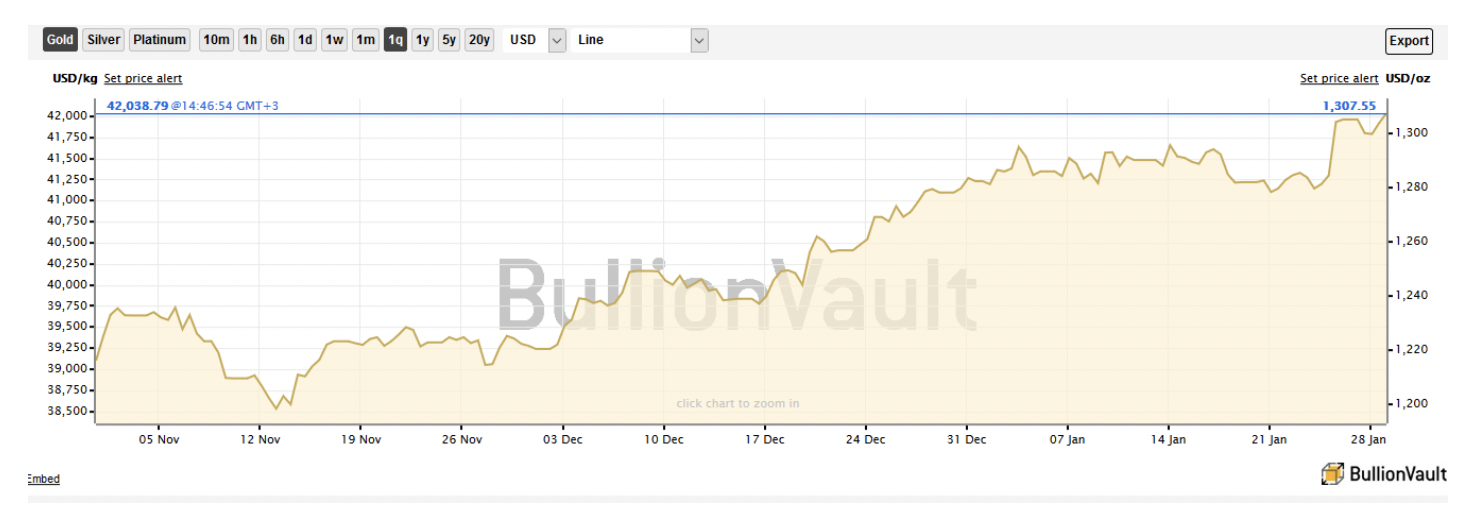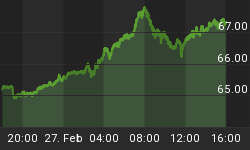A few years back, the charismatic duo of Cameron and Tyler Winklevoss (aka the Winklevoss twins) made a rather outlandish claim that bitcoin was better at being gold than gold itself. Recently, the Gemini crypto exchange founders reiterated their bullish stance by making a bold prediction that bitcoin would one day exceed gold’s $7 trillion market cap.
It certainly takes some gumption to say that after last year’s crypto massacre and especially now that some experts are declaring just the opposite—that bitcoin and crypto are losing out to gold.
Flight from bitcoin

(Click to enlarge)
Source: CoinDesk

(Click to enlarge)
Source: Bullion Vault
Bitcoin has been unable to break above the $4,000 handle convincingly for more than 10 weeks since it plunged below the previous $6,000 floor in November. If anything, the leading crypto has continuously been looking to test the $3,000 psychological level for the first time since the late 2017 mega-rally.
In sharp contrast, gold has been enjoying a renaissance with the spot price of $1,307.53 on Jan. 29 at 6.30am ET representing a nice 7.5-percent climb from the October 31 close of $1,216.15.
Jan Van Eck, CEO of Van Eck Associates, reckons that what’s happening is a trend reversal with investors losing interest in bitcoin and other cryptos and instead of putting their money in traditional assets like gold. Van suggests that bitcoin might have been responsible for gold’s malaise for much of last year but the tables have now turned.
Van Eck’s prognosis is not based on mere sentiment—4,000 bitcoin investors polled by his firm revealed that gold would be their #1 investment of choice in 2019.
And he has a solid point. Related: Hackers Tap Into The U.S. Electric Grid
With a downward deviation of as much as 50 percent vs. 8 percent for gold, bitcoin is hardly winning any battles against the yellow metal as a store of value. Gold is a time-tested safe haven that takes a lot to keep out for the count for long.
Meanwhile, Crypto appears to be hanging precariously in the balance.
As Finance Magnates previously reported, the cryptocurrency market is proving to have a nasty bite with numerous crypto companies and exchanges scaling down operations including letting go of their employees. High-profile crypto companies like Bitmain and ConsenSys have already laid off large portions of their staff while some mining firms are pulling out of the industry for good.
In December, Japan-based IT giant GMO Internet announced plans to close down its crypto operations due to falling profitability of its mining chips before reports surfaced shortly after that e-commerce peer DMM.com planned to follow suit.
Gold Prognosis Good
The outlook for gold appears bright at this stage. Gold traders mostly had a year to forget as a brawny dollar took a big hit on the yellow metal. Safe haven demand for the greenback was strong in 2018 mainly because the U.S. economy continued doing well and helped alleviate fears of an impending recession. A strong dollar makes commodities priced in the currency more costly and less attractive hence the poor performance by gold and other key commodities.
But optimism for the U.S. economy can only go so far, and gold has to sooner or later reclaim its mantle from the greenback as the main safe haven asset. The fundamentals are mostly in favor of gold.
The economic fallout from U.S.-China trade war is now beginning to be felt. The U.S. and China have only five weeks to work out a deal that will be agreeable to both sides. But with both countries playing hardball tactics and asking for major concessions, this is likely going to be a pyrrhic and a short-lived victory for either side. On his part, president Trump wants China to open up its markets to U.S. agricultural products and to stop forcing U.S. companies from handing over valuable technology—both of which require drastic and unlikely changes from Beijing. Meanwhile, Xi is demanding that Washington reduces or sharply lowers the 10 percent tariffs it has imposed on $250-billion worth of Chinese goods.
Related: Markets Inch Lower As Investors Remain Cautious
Few are optimistic that anything much will be achieved as the trade war truce winds down and face-to-face talks resume on January 30. According to Eswar Prasad, former China director at the IMF:
“My baseline assumption is that very close to the deadline, we will come up with a deal that certainly will not be comprehensive, durable and long-lasting by any means but at least allows both sides some breathing room by de-escalating hostilities or at least a cessation of future hostilities.”
Meanwhile, past decisions by Washington and the world’s central banks will continue weighing down heavily on the dollar. Quantitative tightening by the Fed and an end to quantitative easing by the ECB have been mopping up the liquidity needed to support the demand for riskier assets in a heavily indebted world. While a “mini-deal” between Washington and Beijing could help counteract the ongoing risk aversion, the continued unwinding of a decade-long sugar rush and liquidity injection by central banks; a drop in bond yields, a more dovish Fed and an end-of-cycle market dynamics will create formidable headwinds going forward.
Although bitcoin should in theory also benefit from all these snafu, it lacks well-established liquidity gateways that facilitate flows from other leading assets like bond, stocks and ETFs.
By Alex Kimani for Safehaven.com
More Top Reads From Safehaven.com
















